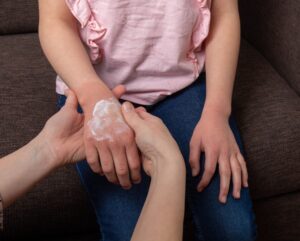Eczema is a common skin condition in children, especially during infancy and early childhood. Many parents feel anxious when their child develops eczema, unsure of how to care for their child's skin properly. Eczema not only causes redness, dryness, and flaking of the skin but can also lead to intense itching, affecting the child's sleep and mood. So, how can parents effectively care for their child's skin with eczema? Today, we will introduce simple and effective care methods in an easy-to-understand way.
Example of Eczema Care for Children
For instance, 4-year-old Zhan Chen recently developed eczema. His parents noticed that he often scratched his skin, especially on areas like his elbows and the back of his knees, which are common sites for eczema flare-ups. Chen's skin became red, cracked, and dry, especially during dry weather or exposure to allergens. After a doctor's diagnosis and proper care by his parents, Chen's eczema improved significantly, and his skin condition began to heal.
1. Moisturizing the Skin is Key
Children with eczema tend to have much drier skin than those without the condition, making moisturizing an essential step in eczema care. Parents can choose fragrance-free, gentle moisturizing products, such as thick creams or ointments, and apply them at least twice a day, especially after bathing. Avoid using products with alcohol or fragrances, as these ingredients may aggravate the skin.
Tip: You can use baby-specific, fragrance-free moisturizers to minimize skin irritation.
2. Avoiding Irritants
Eczema flare-ups are often triggered or worsened by allergens or irritants. Common triggers include pollen, pet dander, certain fabrics (such as wool or synthetic materials), and harsh soaps. Parents should try to limit their child's exposure to these substances that may worsen eczema symptoms.
Common allergens include:
- Pollen: Pollen levels are high in spring and fall, so try to avoid taking your child outside during peak pollen seasons.
- Pets: Pet dander can worsen eczema, especially when children come into contact with pets.
- Cleaning products and detergents: Use fragrance-free and gentle laundry detergents and cleaning products to avoid skin irritation.
3. Control Scratching Behavior
Eczema is often accompanied by intense itching, which can lead to scratching. Scratching can cause skin damage, infections, and make eczema worse. To reduce scratching, parents can have children wear soft cotton gloves or sleeves, especially at night, to avoid skin damage while sleeping.
Tip: If scratching is severe, consider using mild anti-itch ointments or, as advised by a doctor, appropriate medications to alleviate itching.
4. Choosing the Right Bathing Method
Bathing is an important aspect of eczema care. While bathing helps cleanse the skin, frequent baths or hot water can make the skin drier and exacerbate eczema symptoms. It is recommended that children with eczema bathe once a day, with water temperature set between 37-38°C (98.6-100.4°F). Use mild, fragrance-free bath products to avoid irritating the skin.
Tip: Immediately after bathing, apply a moisturizing cream, preferably one with strong hydrating properties.
5. Healthy Diet and Lifestyle
Diet plays a significant role in eczema management. Certain foods can trigger or worsen eczema symptoms. Parents should be aware of their child's diet and avoid common allergens like milk, eggs, or nuts. If a child has a food allergy history, dietary adjustments should be made under the guidance of a doctor.
Additionally, maintaining healthy lifestyle habits can help control eczema. Avoiding excessive fatigue, ensuring adequate sleep, and following a regular routine can boost the child's immune system and reduce eczema flare-ups.
6. Regular Medical Check-ups and Professional Care
If eczema symptoms persist or worsen, parents should take their child to see a doctor. Doctors may prescribe topical medications, such as corticosteroid creams or calcineurin inhibitors, to reduce inflammation. For severe cases, other treatments, such as phototherapy, may be recommended.
Final Recommendations
Caring for eczema is not just about moisturizing or avoiding irritants; it is a comprehensive process that requires close monitoring of the child's skin condition, timely adjustment of care methods, and collaboration with a doctor for appropriate treatment.
With scientifically effective care, eczema symptoms can be controlled, and the child's skin condition can significantly improve. We hope this guide helps parents care for children with eczema, allowing them to grow up in comfort and good health.
References
- National Eczema Association. "How to Care for Your Child's Eczema." Official Website
- Mayo Clinic. "Eczema (Atopic Dermatitis)." Official Website
- PubMed. "Management of Eczema in Children." PubMed
- DermNet New Zealand. "Atopic Dermatitis Treatment in Children." Official Website













